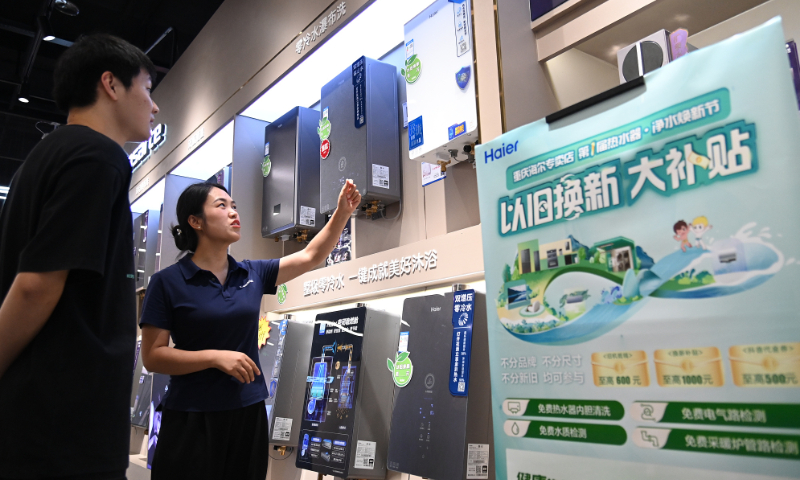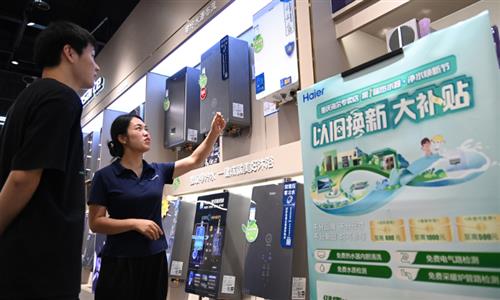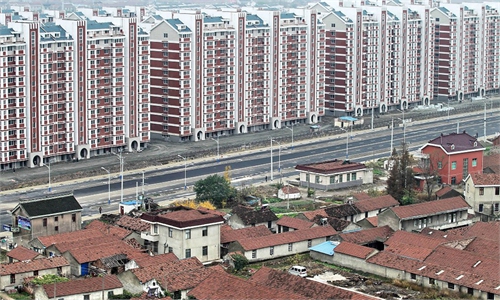Nation intensifies efforts to boost consumption as trade-in policies strengthen market impact
Trade-in policies increasingly effective in supporting market: expert

A staff member introduced consumers to a trade-in program for smart home appliances at a home appliance store located in Chongqing's Shapingba district on July 11, 2024. Photo: VCG
Chinese commerce authorities nationwide have ramped up efforts to boost consumption, with the implementation of trade-in policies continuing to take effect. One latest example is the inspection tour led by Zhu Min, director of the Shanghai Municipal Commission of Commerce, to major shopping malls such as New World City in Shanghai, conducting in-depth study on relevant companies' participation in home appliance trade-in activities, Securities Times reported on Sunday.
During the inspection, Zhu said that Shanghai must implement high-quality national policies and measures to promote consumption and expand domestic demand, including conducting research on the consumption characteristics of young people and launching more new corresponding products.
The trade-in of consumer goods for new ones has been carried out in an orderly manner and has achieved remarkable results in stimulating consumption, according to China's Ministry of Commerce (MOFCOM).
The national trade-in program has driven up consumption by over 1 trillion yuan ($140 billion), the MOFCOM said.
Specifically, vehicle trade-in measures have driven the sales of over 5.2 million passenger cars as of Friday, according to MOFCOM data.
Moreover, the trade-in policy for household appliances has led to sales of more than 49 million units across eight major categories. The home renovation and kitchen and bathroom trade-in programs have driven the sales of over 51 million related products.
According to the Xinhua News Agency on Sunday, citing Vice Commerce Minister Sheng Qiuping, the country will launch special campaigns dedicated to stimulating consumption and take more practical measures to unleash consumption potential, including promoting consumer goods trade-ins and fostering new consumption models.
More measures will be taken to promote ice and snow consumption, the debut economy, and sales of new energy vehicles and intelligent home appliances, Sheng said.
"From the current results of government-driven consumption promotion efforts, the outcomes have been quite significant... This shows that relevant government departments have recognized the pressing need to drive consumption and are determined to boost it," Li Changan, a professor at the Academy of China Open Economy Studies at the University of International Business and Economics, told the Global Times on Sunday.
Through the trade-in policies, with the support of fiscal subsidies, the government is able to stimulate private consumption, achieving a multiplier effect and potentially driving overall consumer demand, Li said.
The trade-in policies have taken root in many parts of the country as a major government push to boost consumption.
In East China's Zhejiang Province, the trade-in program saw the participation of over 4,500 businesses and more than 5 million consumers, according to the People's Daily on October 29. Zhejiang used a total of 6.426 billion yuan from the special national bond fund, with the subsidy policy directly driving consumption over 66 billion yuan, the report said.
Moreover, in South China's Guangxi Zhuang Autonomous Region, the total number of participants in the consumer goods trade-in program has surpassed 1 million, benefiting millions of households and driving transaction volumes to over 10 billion yuan, according to media reports.
"While positive results are emerging, it is important to note that the current growth in consumption is primarily policy-driven… More observation is needed to assess the sustainability of these policies, particularly regarding how long their impact can last," Li said.
Looking ahead, Li said that stimulating consumption may require broader coverage and stronger support, with the aim of establishing a long-term mechanism. More collaborative policy effort across various government departments would be expected to effectively stimulate or stabilize consumption and expand consumer demand for a longer-lasting impact, the expert said.
Further boosting domestic demand and expanding high-level opening-up are among the top priorities for China's economic work in 2025, according to a recent top meeting.
The meeting of the Political Bureau of the Communist Party of China Central Committee on December 9 said that the country should vigorously boost consumption, improve investment efficiency, and expand domestic demand on all fronts, the Xinhua News Agency reported.



